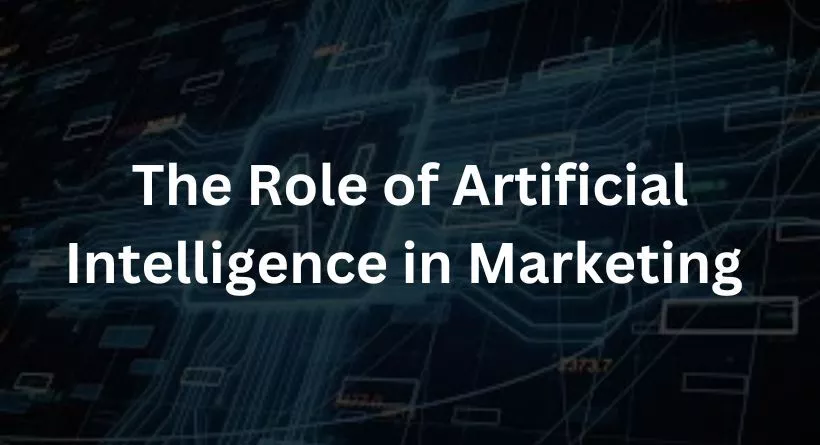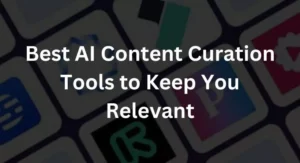
In the ever-evolving realm of marketing, change is the only constant. With the advent of artificial intelligence (AI) and the rise of intelligent marketing tools, the landscape of marketing is undergoing a monumental transformation. AI marketing, powered by technologies like natural language processing (NLP), machine learning (ML), sentiment analysis, and more, is revolutionizing the way businesses connect with their audience. In this article, we’ll explore the multifaceted role of AI in marketing and how it’s empowering marketers to excel in their endeavours.
How is Artificial Intelligence Used in Marketing?

AI-driven marketing is on track to drive 45% of the global economy by 2030, and it’s achieving this by revolutionizing various aspects of marketing. Here’s a closer look at how AI is reshaping the marketing landscape:
You may also like reading: The Role of AI in Creating a More Human Customer Experience
1. Social Media Listening
AI is supercharging social media listening, making it more efficient and insightful. Tools like Sprout are using AI algorithms to identify and extract valuable insights from vast amounts of social media data in real-time. Social media sentiment analysis helps marketers gain a profound understanding of their customers’ thoughts and intentions, enabling them to take strategic actions.
2. Automation
AI-driven automation streamlines tasks for social media managers and customer service teams. It takes the guesswork out of scheduling posts, categorizing messages, and maintaining a unified brand voice. This results in improved operational efficiency and quicker response times, enhancing customer engagement.
3. Audience Segmentation and Personalization
AI enables marketers to align their campaigns with the customers most likely to buy their products. Programmatic advertising streamlines the selection of digital ads, fostering brand loyalty and creating powerful brand awareness campaigns.
4. Data Analysis for Customer Insights
AI and ML provide valuable insights into audience sentiment, customer care performance, and social media engagement metrics. This empowers businesses to adapt to changing market trends and deepen customer relationships.
5. Reputation Management
AI-enabled brand reputation management allows brands to monitor negative sentiments in real-time, select the right influencers, and provide proactive customer care. This helps avert potential brand threats before they escalate.
6. Competitive Intelligence
AI tools help businesses identify opportunities for product enhancements, analyze their competitors’ market share, and compare their social performance with competitors. This enables agile strategies and maintaining a competitive edge.
7. Multilingual Advantage
AI marketing tools effortlessly extract customer insights from multilingual data, ensuring that marketing strategies align with cultural standards and preferences in different regions.
Which AI Technologies Enable Marketing?

Powerful social marketing platforms like Sprout utilize various AI technologies to provide targeted insights:
1. Machine Learning (ML)
ML uses statistical methods to analyze social data, providing high-precision insights into customer experience and audience sentiment. ML models continually improve as they process more data, making them ideal for scaling business operations.
2. Natural Language Processing (NLP)
NLP enables AI marketing tools to understand and extract critical information from social listening data. It can interpret data even if it contains colloquialisms, emojis, or spelling mistakes, making it versatile and effective.
3. Semantic Search
Semantic search algorithms categorize keywords into semantic clusters, eliminating duplicates and providing accurate measures of customer experience and brand performance.
4. Named Entity Recognition (NER) and Neural Networks
NER helps AI platforms identify important entities in big data, while neural networks store interconnected data points for deep learning, providing more precise results over time.
The Future of AI in Marketing
AI marketing is advancing rapidly, reshaping businesses in numerous ways:
1. Computer Vision
Computer vision allows AI marketing tools to derive insights from non-text digital data, improving tasks like product quality control, facial recognition, and biometric authentication.
2. AI Chatbots
AI chatbots are changing traditional marketing by enhancing brand visibility, boosting engagement, and providing fine-grained insights for predictive and prescriptive marketing.
3. Predictive and Prescriptive AI
Predictive analytics enables businesses to anticipate outcomes and develop strategies based on past data, while prescriptive analytics helps create highly targeted marketing materials for optimal results.
4. Responsible AI
AI marketing takes into account ethical and societal implications, ensuring fair, secure, reliable, inclusive, and transparent AI tools. Data privacy, copyright, and governance rules are being developed to remove biases and prioritize fairness.
Conclusion
In conclusion, AI marketing is empowering businesses to create a foundation for growth and future success. AI technologies like sentiment analysis, NLP, and virtual agents are pivotal in reaching business goals, from revenue optimization to adapting to market changes. With targeted AI-driven customer insights, you can proactively engage with customers, foster loyalty, and drive market growth.
FAQs
1. How is AI transforming the marketing landscape?
AI is revolutionizing marketing by enhancing social media listening, automating tasks, enabling personalization, providing customer insights, managing brand reputation, offering competitive intelligence, and facilitating multilingual marketing.
2. Which AI technologies are driving marketing?
Key AI technologies in marketing include machine learning, natural language processing, semantic search, named entity recognition, and neural networks.
3. What is the future of AI in marketing?
The future of AI in marketing includes computer vision, AI chatbots, predictive and prescriptive AI, and a focus on responsible AI to ensure fairness and transparency.
4. How can businesses benefit from AI marketing?
Businesses can benefit from AI marketing by optimizing customer engagement, streamlining operations, improving brand reputation, and staying ahead of competitors.
5. What role does AI play in personalized marketing?
AI plays a crucial role in personalized marketing by segmenting audiences, automating tasks, and providing deep customer insights, enabling businesses to tailor their marketing strategies effectively.





